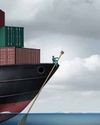The global industry got some respite in the second half of the year with cargo volumes growing. Logistics players in India are expanding capacity to meet the rise in demand coming from increased economic activity.

The global maritime industry was surviving a prolonged dry spell when it welcomed the new year of 2017 with a rather sombre mood, but as the quarters passed by the market dynamics changed and the industry could finally get some sunshine. According to data revealed by Drewry, global box volumes continued to expand in Q3 2017 (July to September) and are projected to attain a growth of 5.5 per cent y-o-y in 2017. India particularly posted stellar performance with major ports posting a growth of 3.24 per cent, together handling 326.4 million tonnes of cargo during the period April to September 2017 as against 316.1 million tonnes handled during the corresponding period of previous year.
On the shipping side the consolidation binge continued with the most noteworthy being the Hamburg sud’s acquisition by Maersk. The deal is set to increase volumes of both Maersk Line and APM Terminals, while empowering the combined entity to control approximately 19 per cent of the world’s container fleet capacity.
Maersk continued to be in the spotlight for various reasons be it the Petya malware attack that jeopardised operations of APM Terminals or the digitalisation initiative. Maersk further entered into slot exchange and slot purchase agreements with MSC and HMM. Maersk Line and MSC took over a number of charters and operations of vessels currently chartered to HMM. The cyber-attack had cost about $300 million to the shipping line.
Digitalisation
This year saw the industry embrace digitalisation. Maersk Line made transactions completely “paperless.” Not to stay behind, CMA CGM inked seven year partnership with Infosys. The goal is to simplify and transform CMA CGM's IT applications and improve customer service excellence.
Coastal shipping
Bu hikaye Maritime Gateway dergisinin December 2017 sayısından alınmıştır.
Start your 7-day Magzter GOLD free trial to access thousands of curated premium stories, and 9,000+ magazines and newspapers.
Already a subscriber ? Giriş Yap
Bu hikaye Maritime Gateway dergisinin December 2017 sayısından alınmıştır.
Start your 7-day Magzter GOLD free trial to access thousands of curated premium stories, and 9,000+ magazines and newspapers.
Already a subscriber? Giriş Yap

Impact Of Covid-19 On Shipping And Logistics
Industry stalwarts discuss threadbare the prevailing logistics and supply chain scenario and issues in clearing cargo during the COVID-19 lockdown

Digital Platforms Defy Lockdown
Digital trading modules such as eNAM are enabling farmers to move their produce from farm to market even during the lockdown

GARMENT TRADE TRAMPLED
As retailers face a shutdown in US and Europe, the cascading affect has caused mass cancellation of orders in Bangladesh

TRADE RESUMES WITH CHINA
While India has allowed uninterrupted movement of imports into Nepal even during lockdown, China is reopening its borders as it emerges from the pandemic
LESS HUMAN INTENSIVE, MORE DATA DRIVEN
AI provides transformational opportunity for logistics industry by improving customer experience, operational efficiency, faster turnaround time and lower cost while ensuring security and transparency. Macro environment requires industry to transform to be less human intensive, agile and data driven, all of which can be accelerated by AI adoption, shares Gangadhar Gude, Founder & CEO, atai.ai

SHAKEN AND STIRRED
The COVID-19 pandemic has partially paralysed the logistics and supply chain, but the industry is still deterred to ensure supply of essentials continues

TRADE STUCK, ECONOMY SLOWS DOWN
Sri Lankan economy slows down as trade deficit widens and supply chain disrupts amidst lockdown

LENDING INTELLIGENCE TO SUPPLY CHAIN
If you’re shipping millions of dollars’ worth of pharmaceuticals, high-end electronics, expensive seafood, or precious metals, what would you be willing to pay for the ability to ‘ask’ your shipment where it is right now and whether it’s ok? What would you pay for a freight smart enough to raise an alarm before it spoils? Artificial Intelligence enables that and much more…

CONTAINER LINES SIGNAL ‘SOS'
As the per-unit cost of operations increases many lines are forced to blank sailings which has hit their bottom line real hard. The Government and Terminal Operators therefore need to actively consider reduction in Vessel Related Costs

IMO 2020 And The Covid-19 Curse
The COVID-19 outbreak has shaken and stirred the already volatile bunker market. While the refiners adjust their capacities and shipping lines choose their path to compliance, the market dynamics are yet to reach an equilibrium